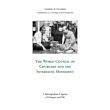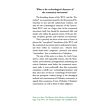The World Council of Churches and the Interfaith Movement
by Metropolitan Cyprian of Oropos and Fili
Translated by Archbishop Chrysostomos of Etna and Hieromonk Patapios
Translated by Archbishop Chrysostomos of Etna and Hieromonk Patapios
Publication Data: Etna, CA: Center for Traditionalist Orthodox Studies, 1997
Format: softcover
Number of Pages: 69
Dimensions (l × w × h): 19.7 cm × 12.1 cm × 0.4 cm
ISBN: 0‒911165‒28‒2
by Metropolitan Cyprian of Oropos and Fili
Translated by Archbishop Chrysostomos of Etna and Hieromonk Patapios
Number I of Contributions to a Theology of Anti–Ecumenism
“From about the middle of the seventeenth century and thereafter, there began among the Protestant confessions a movement towards coöperation in many spheres, a turn towards unity. This union effort among various Christian communions has taken on a more organized form in the twentieth century, within the context of the so–called ecumenical movement and, of late, through its institutional organ, the WCC. [...]From the very beginning, unfortunately, these union efforts included Orthodox, too; we say ‘unfortunately’ because in a clearly Protestant attempt to search for Christian unity, the basic presuppositions of this quest being the heretical doctrines of the ‘invisible church’ and the ‘branch theory,’ the Orthodox Church has no place, since she identifies her very being with the One, Holy, Catholic, and Apostolic Church.”
—“The World Council of Churches and the Interfaith Movement”
CONTENTS
§ 1. The Prime Vision of the WCC
§ 2. The Interfaith Broadening of the WCC
§ 3. The Director of the Interfaith Dialogues
§ 4. The General Assembly in Canberra
§ 5. Dr. Chung Hyun Kyung’s Presentation
§ 6. Dr. Chung in Munich and Brazil
§ 7. A Final, Grave Question
Format: softcover
Number of Pages: 69
Dimensions (l × w × h): 19.7 cm × 12.1 cm × 0.4 cm
ISBN: 0‒911165‒28‒2
by Metropolitan Cyprian of Oropos and Fili
Translated by Archbishop Chrysostomos of Etna and Hieromonk Patapios
Number I of Contributions to a Theology of Anti–Ecumenism
“From about the middle of the seventeenth century and thereafter, there began among the Protestant confessions a movement towards coöperation in many spheres, a turn towards unity. This union effort among various Christian communions has taken on a more organized form in the twentieth century, within the context of the so–called ecumenical movement and, of late, through its institutional organ, the WCC. [...]From the very beginning, unfortunately, these union efforts included Orthodox, too; we say ‘unfortunately’ because in a clearly Protestant attempt to search for Christian unity, the basic presuppositions of this quest being the heretical doctrines of the ‘invisible church’ and the ‘branch theory,’ the Orthodox Church has no place, since she identifies her very being with the One, Holy, Catholic, and Apostolic Church.”
—“The World Council of Churches and the Interfaith Movement”
CONTENTS
§ 1. The Prime Vision of the WCC
§ 2. The Interfaith Broadening of the WCC
§ 3. The Director of the Interfaith Dialogues
§ 4. The General Assembly in Canberra
§ 5. Dr. Chung Hyun Kyung’s Presentation
§ 6. Dr. Chung in Munich and Brazil
§ 7. A Final, Grave Question
Write Your Own Review






